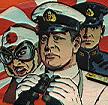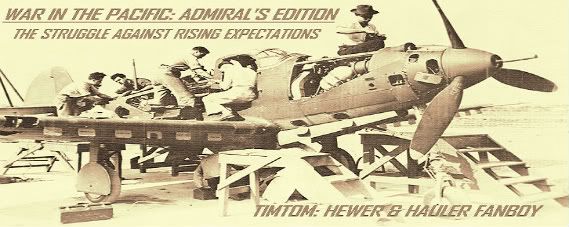The text below is lifted from my MPhil thesis (slightly edited). It's a social history of American Infantry in WWII. I briefly touch upon the issue of atrocities within the wider context of the psychological effects of combat on the individual, including his normative habitude. It follows upon a section dealing with incidents of prisoner-killings in Europe.
I might add that I've seen nothing to suggest these things to be a particularly American phenomenon in any way. I realise the below might not be what some gentlemen here would want to hear. I just hope that one will remember to rubbish the evidence, not the man


"Yet German prisoners were not killed
because they were German. Combat in Europe was without the racial undertones that underlay warfare in the Pacific. As historian John Dower argues, the Pacific war was conducted within a paradigm of anti-Japanese racism in American cultural and political dialectic both before and during the war. One of the first observations of thoroughly humane Ernie Pyle, arriving to report on the Pacific war, was on the nature of the enemy:
...In Europe we felt our enemies, horrible and deadly as they were, were still people. But out here I’ve already gathered the feeling that the Japanese are looked upon as something inhuman and squirmy – like some people feel about cockroaches or mice. I’ve seen one group of Japanese prisoners in a wire-fenced court-yard, and they were wrestling and laughing and talking just as humanly as anybody. And yet they gave me a creepy feeling and I felt in need of a mental bath after looking at them (Nichols 1986, p.367.)...
Indeed, in wartime illustrations the Japanese were habitually caricatured as monkeys or vermin.
In table 17 we have already seen how the prospect of killing a Japanese soldier only troubles 22% of a sample of ordinary, decent young Americans, and positively appealed to 44% of them. The subject of American atrocities is necessarily a hazy one. Japanese atrocities against Allied civilians and prisoners are well known, and were well known contemporarily. Japanese battlefield atrocities, real or perceived, great or small, were quick to make the rumour circuit, and became part of a body of folklore affirming the base inhumanity of the Japanese. In one survey, the actual percentage of troops having witnessed a German or Japanese atrocity was the same (13%), but the number of men in the Pacific who had heard atrocity stories (45%) was double that of Europe (24%) (Stouffer 1949 vol.II, p.158; p.162.). The Japanese concepts of death before dishonour and the apparent disregard Japanese soldiers demonstrated for their own lives just proved the unfathomable and ultimately alien nature of the Japanese psyche. Japanese soldiers wanted to die, it seemed, and one was frankly doing everybody a service by helping them along.
Everything was alien to the soldiers in the Pacific. They fought an enemy who not only looked different, but with whom they shared no cultural, religious, or linguistic bonds what so ever, and whose cultural concepts of war were very different. Even the terrain and climate reeked of foreignness. Combat worked to debase the value of life and broke down established norms and taboos. With the added weight of mutual racism, the result was a war of extermination.
Some senior commanders were fairly blunt in their exhortations. Among those to go on record is Admiral William Halsey, commander of Allied forces in the Solomons. In one of many soundbites, he declared, “the only good Jap is a Jap who’s been dead six months” (Linderman 1997, p.178.); also General John DeWitt, commander of Army troops on the American West coast and Alaska, whose fatherly advice to the troops about to invade the Aleutians included “Kill! Kill! Kill all Japanese! The only good Jap is a dead Jap” (Perret 1991, p.270n.). Perhaps Charlie Burchett can be excused for his one regret about the war ending: “I wished I’d gotten more of the bastards” (McManus 2000, p.176.).
As in Europe, trophy collecting was universal. Unlike Europe, it was not limited to enemy equipment. The most common form seems to have been gold-teeth collecting. In a rare example of someone owning up to personally doing it, Michael Witowich explains how, after shooting a likely Japanese corpse in the head, “automatically the mouth opened up. Man! All them gold teeth staring at me. And I didn’t knock them out with a rifle, but I used pliers. I had a whole canteen of gold teeth” (Ries 2001, p.103). Another mode of extraction, Eugene Sledge explains, was by knife, “putting the tip of the blade on the tooth of the dead Japanese – I’ve seen guys do it to wounded ones – and hit the hilt of the knife to knock the tooth loose” (Terkel 1984, p.62.).
Other collectors items were fingers, ears, noses, bones, and skulls. Ship-bound for Guadalcanal, journalist Richard Tregaski overhead marines boasting about the ear- and gold-teeth they were going to collect (Dower 1986, pp.64-65.). If this phenomenon were purely the product of combat-induced moral disintegration, why would men of an untried division make such talk? On Luzon, Harry Akune recounts, one sailor turned up during a rare prisoner-interrogation asking to cut off the prisoner’s ears. “I promised my kids some Jap ears”, the sailor begs before being send off to find his own ears (O’Donnell 2003, p.200.). Presumably infantrymen with similar commitments could dispense with the begging. Charles Lindbergh spoke to a marine officer stating “our boys cut [ears and noses] off to show to their friends in fun, or to dry and take back to the States when they go. We found one marine with a Japanese head”. Going through customs on his return from the Pacific, Lindbergh is asked whether he had any bones to declare (Lindbergh 1970, pp.919-923.).
Occasionally newspapers and magazines at home ran human-interest stories about trophy collecting. One featured a concerned mother waiting to receive an ear from her son. Would the local council mind if she nailed it to the front door? Another was about an under-age boy who bribed his way into the Army: Against the promise of a pair of ears, the kid persuades a chaplain to verify his age. One soldier sent FDR a letter-opener carved from human bone. Another sent his fiancée a skull (Dower 1986, p.65.).
It is well-known that very few Japanese prisoners were taken and that the Japanese habitually chose suicide over surrender (or so the American sources tell us); however it seems that many Japanese that failed in this were expedited by their American foes. It is in the nature of things that it is impossible to ascertain exactly how widespread this was. One oddity shows up in table 17. The groups polled in questions one and four are identical. Answering question four obviously presupposes having seen a prisoner in the first place, and it will be noticed that the proportion of enlisted men answering the question is much higher in the Pacific than in Europe. In view of the supposed Japanese no-surrender policy, would one not expect the Pacific percentage to be lower? Similarly, of the 220 Korean labourers present on Makin at the time of the assault on that island, a minimum of 116 were killed (54%). On neighbouring Tarawa, 1,069 out of 1,198 Korean labourers wer killed (89%). Apparently the Japanese were not alone in fighting to the death (Crowl & Love 1955, p.71-73, p.125, p.156.).
In fact, even in Europe, feeling “all the more like killing them” was not an academic proposition: In Normandy, Rich Richardson’s outfit captured 30 oriental-looking Soviets in German service. They were all eventually gunned down, because, as the instigator reasoned, “the Japs killed my brother!” (Hastings 1993, p.100.) On Peleliu, Eugene Sledge tells us, “my company took two prisoners. At Okinawa, we took five. We had orders not to kill the wounded...but the feeling was strong” (Terkel 1984, p.62.). On Biak, a colonel of the 41st Infantry Division (nicknamed “The Butchers” after an incident involving a Japanese field hospital) told Charles Lindbergh that “our boys just don’t take prisoners”. “Well, some of our boys do kick their teeth in”, a soldier told Lindbergh of the Japanese, “but usually they kill them first”. Upon visiting an old friend on General MacArthur’s staff in Brisbane, the ex-governor of Wisconsin Phil La Folette, Lindbergh recorded: “It is freely admitted that some of our soldiers torture Jap prisoners...our men think nothing of shooting a Japanese prisoner or a soldier attempting to surrender. They treat the Jap with less respect than they would give an animal, and their acts are condoned by almost anyone” (Lindbergh 1970, p. 881; p.859; p.875). On New Guinea, Nelson Peery admits, “we saw all the brutality and in some instance just plain savagery against Japanese soldiers who were trying to surrender, or who had surrendered, who were shot or clubbed”. After a failed Japanese attack on an American position on Bougainville, Dennis Weaver overheard an exchange between a colonel and a general. Beyond the American perimeter the Japanese wounded lay a moaning carpet, the nearest on the wire almost within touching distance. “But sir, they are wounded and want to surrender”, gasps the colonel. “You heard me, colonel”, the general retorts, “I want no prisoners. Shoot them all” (Lewis 2001, p.169.). In Joseph Routledge’s outfit, going five island campaigns without taking a single prisoner was “the secret pride of our company” (Linderman 1997, p.178.)."
Reference:
Crowl, Phillip A. & Love, Edmund G.: Seizure of the Gilberts and Marshalls. Office of the Chief of Military History, Departmant of the Army 1955.
Dower, John: War without Mercy: Race and Power in the Pacific War. Faber & Faber 1986.
Hastings, Max: Overlord: D-Day and the Battle for Normandy. Papermac 1993.
Lewis, Jonathan & Steele, Ben: Hell in the Pacific. Channel Four Books 2001.
Lindbergh, Charles A.: The Wartime Journals of Charles A. Lindbergh. Hercourt Brace Jovanovich 1970.
Linderman, Gerald F.: The World Within War: America’s Combat Experience in World War II. The Free Press 1997
O’Donnell, Patrick K.: Into the Rising Sun: In Their Own Words, World War II’s Pacific Veterans Reveal the Heart of Combat. The Free Press 2003.
Perret, Geoffrey: There’s a War to be Won: The United States Army in World War II. Ballantine Books 1997.
McManus, John C.: The Deadly Brotherhood: The American Combat Soldier in World War II. Presidio 2000.
Nichols, David (ed.): Ernie’s War: The Best of Ernie Pyle’s World War II Dispatches. Random House 1986.
Ries, Laurence: Horror in the East. BBC Worldwide 2001.
Stouffer, S.A. et al.: The American Soldier vol.I-II. Princeton University Press 1949.
Terkel, Studs: The Good War: An Oral History of World War II. Pantheon Books 1984
[edited for spelling]














